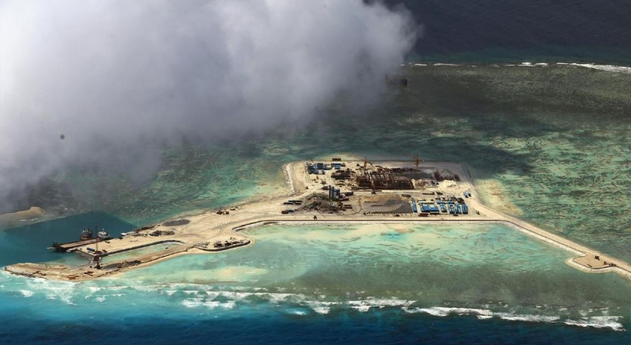Headline
PH security expert: China puts up ‘Great Wall of the Sea’

Chinese recent development at the Burgos (Gaven) Reef, located in the Tizard Banks, near the center of the Spratly islands. (Photo courtesy of Asia Maritime Transparency Initiative)
MANILA – The Philippines, Japan and the United States, among other concerned countries, now have increasing apprehension over China’s almost completed massive land reclamation activities and soon to be started infrastructure building in the disputed Spratly Islands.
As of now, China has been continuing with its land reclamation works in Burgos (Gaven), Calderon (Cuarteron), Kagitingan (Fiery Cross), Mabini (Johnson South), McKennan (Hughes), Panganiban (Mischief) and Zamora (Subi) and reefs in the disputed waters. These reefs are well within the Philippines’ exclusive economic zone (EEZ).
In yet another attempt to stop China from progressing its artificial island building, the Philippines is considering raising the issue to the United Nations arbitral tribunal for a provisional measure issuance.
According to Filipino security expert and National Defense College of the Philippines professor Chester Cabalza, China has been illegally occupying the Philippine territory with its land reclamation within the country’s EEZ.
“It has effectively put up its own Great Wall of the Sea,” Cabalza said in an interview.
“They are occupying our territory rapidly because they have a timeline that they need to meet.
This is already an illegal occupation by China through their construction of infrastructure and as a result, we lose a lot of our resources,” Cabalza added.
And as China continues to control the disputed waters where it has military presence, Cabalza pointed out that the country’s move is an Anti-Access Area Denial (A2/AD) strategy where foreign militaries are denied access in the said region. By doing so, China has been infringing other countries’ freedom of navigation.
“The more China blocks access to the South China Sea, the more power it gets in the region, as [it controls] the area,” Cabalza said.
Japan, however, would not treat China’s extensive land reclamation activities in the disputed sea a ‘done deal.’
The United States, agreeing with Japan, stressed that China’s continued plans in its artificial islands would only create more tension among affected countries.
China, dismissing all calls, announced the near completion of its land reclamation works in the ‘upcoming days.’ As planned, it will then start building infrastructure in the artificial islands which it claimed would aid environmental conservation, maritime search and rescue and scientific research, among other ‘lawful, reasonable and justified’ projects which they asserted were ‘civilian in nature.’
Supreme Court Senior Associate Justice Antonio Carpio, however, believed that ‘it is not yet too late.’ The Philippines could still continue pursuing resolution to the territorial dispute with China.





















